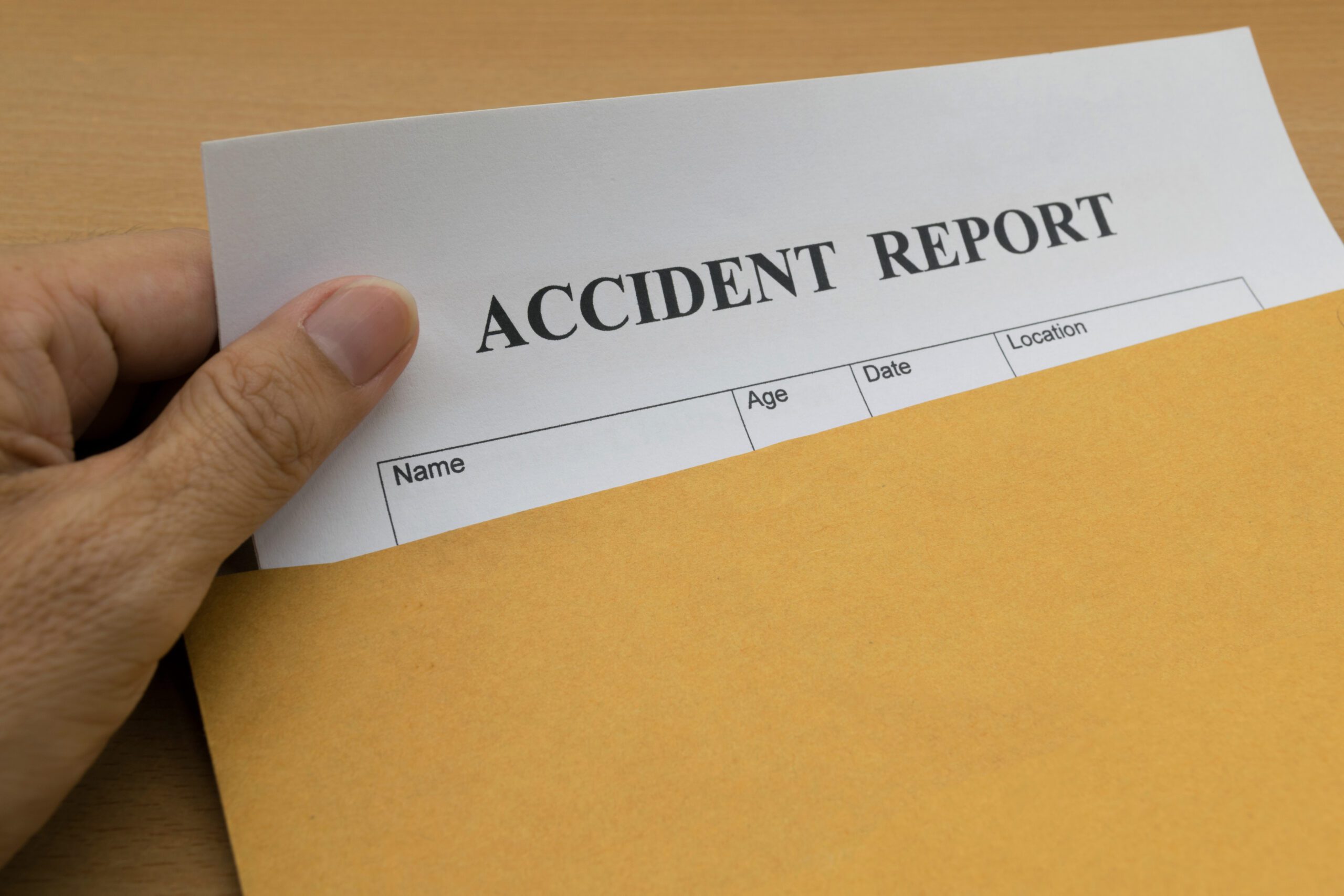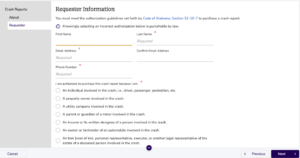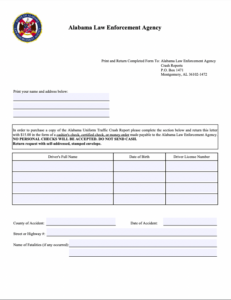
How To Get Your Alabama Crash Report Online | ALEA Accident Reports & Trooper Records
Need to get your Alabama crash report? Whether your accident was investigated by state troopers or local police, you can request your official crash report online through the Alabama Law Enforcement Agency (ALEA). This guide explains exactly how to find and order your report—and why it’s essential for insurance claims and legal action.
How to Get a Copy of Your Alabama Crash Report
You can request a crash report in Alabama online through the Alabama Law Enforcement Agency (ALEA). Reports are typically available 7–10 business days after the accident.
Here’s quick breakdown of how to get your ALEA crash report:
- Visit the ALEA Crash Report Portal
- Provide key details: the driver’s last name, the crash date, and the report number (if available).
- Pay the processing fee (usually $15 to $17).
- Download your report instantly or wait for email delivery.
⚠️ Tip: Double-check the date and spelling when submitting your request to avoid delays.
Below, we’ve outlined in detail the process of obtaining your Alabama crash report.
Wait for Processing
Crash Reports in Alabama are not immediately available. It takes some time for law enforcement to process and submit the reports. Typically, you can access the report within seven to ten days after the accident.
Visit the ALEA Crash Reports Website
The website provides an online portal where you can request and download your police report. Navigate to the website and look for the ALEA Crash Reports section.
Look for the “Driver Records and Accidents” section on the webpage and choose the “Purchase Crash Report” option:
Provide Requested Information and Crash Details
To retrieve your crash report, you’ll need to provide:
-
- The driver’s last name
- The crash date
- If available, the report number
- A valid email address for delivery
- Payment information (credit or debit card)
If you’re missing any of this, contact ALEA directly—or a lawyer can assist with the request on your behalf.
Here is an image of the online request form interface for Alabama accident report requests that you’ll use:
Pay the Fee
- There is $17.00 fee to obtain a crash report. This includes $15.00 for the report and a $2.00 processing fee. Be prepared to make a payment online through the ALEA portal.
Note: The report may take up to 10 business days post-crash date to become available online.
Download and Save Your ALEA Crash Report
Once you’ve completed the necessary steps and made the payment, you can download the Crash Report. Save it to your computer or device for future reference. Having an electronic copy is convenient, and you can print it if needed.
Remember, having your Alabama Crash Report is crucial for various purposes, so it’s advisable to initiate the process as soon as it becomes available. In the next section, we’ll discuss in detail the information included in your Crash Report and how to interpret it.
Getting Your Alabama Crash Report by Mail
If you prefer the traditional mail method, follow these steps:
- Download and Print the Mail-in Form: The crash report form is available on the ALEA website.Here is what the mail-in form for Alabama accident report looks like:
- Fill Out and Post the Form: Complete the form and mail it to:Alabama Law Enforcement AgencyCrash ReportsP.O. Box 1471Montgomery, AL 36102-1472Details you’ll need to include on the form are: your name, your address, driver’s full name, date of birth, driver license number, county of accident, accident date, street or highway #, name of fatalities (if any occurred).Attach a $15.00 cashier’s check, certified check, or money order payable to the Alabama Law Enforcement Agency and a self-addressed, stamped envelope.
Understanding Alabama Crash Reports
After a car wreck in Alabama, one of the first documents you’ll likely encounter is the report. This comprehensive report, filled out by law enforcement officers who respond to the scene, serves as a critical record of the incident. Here’s a breakdown of key elements to help you navigate and comprehend your Alabama crash report:
| Section | Description |
| Basic Information |
|
| Vehicle and Driver Information |
|
| Narrative Description |
|
| Contributing Factors |
|
| Diagrams and Illustrations |
|
| Citations and Violations |
|
| Witness Information |
|
| Injuries and Damages |
|
When and Why You Need an Alabama Crash Report
Obtaining a crash report is of the utmost importance after a car, truck, or motorcycle accident. Here’s when and why you might need this report:
Insurance Claims:
- When filing an insurance claim, your provider will likely request a copy of the crash report. This document serves as a primary source of information for determining liability and processing your claim efficiently.
Legal Proceedings:
- In the event of legal action, such as a personal injury lawsuit, the crash report becomes a vital piece of evidence. Attorneys, courts, and insurance companies use it to understand the circumstances surrounding the accident.
Law Enforcement Interaction:
- If law enforcement officers arrive at the scene of the accident, they will generate a crash report. Having a copy can be valuable if you need to provide information to law enforcement later in the investigation.
Understanding Liability:
- The crash report provides a detailed account of contributing factors, citations, and violations. It can help establish liability and influence the outcome of insurance claims and legal proceedings.
Accurate Documentation:
- Memories of an accident can fade over time, but the crash report offers an accurate and official documentation of the incident. This can be particularly beneficial when dealing with discrepancies in recollections.
Negotiating with Insurance Companies:
- Insurance adjusters rely on the crash report to assess damages and injuries. Having a copy allows you to negotiate from an informed position, ensuring that your side of the story is accurately represented.
Future Reference:
- Even if you don’t immediately foresee the need for the crash report, having a copy for future reference is advisable. Circumstances may change, and having this document on hand can be valuable down the road.
In essence, obtaining an Alabama crash report is a proactive measure to protect your interests and facilitate various aspects of the post-accident process.
Frequently Asked Questions
**How do I get my Alabama crash report online?**
Visit the ALEA Crash Report Portal, enter the crash details, and pay the fee to access your report.
**How long does it take for an Alabama crash report to be available?**
Most crash reports are available 7–10 business days after the incident.
**How much does an ALEA crash report cost?**
The fee is usually between $15 and $17, depending on the delivery method.
**Can I get a crash report in person in Alabama?**
Yes, you can request a report in person at any ALEA Driver License Office, but online is often faster.
**Do I need a lawyer to get my Alabama crash report?**
No, but a lawyer can obtain it on your behalf and use it to support an insurance claim or legal case.
Learn More With a Free Case Review
At Jay Pickering Law Firm, an experienced Alabama car injury lawyer is ready to stand by your side, offering advice and unwavering advocacy. Our clients live in towns and cities across Alabama, from Dothan to Montgomery, Hoover, and Huntsville. If you need help understanding your crash report—or what to do next—we’re here to help. We can request your report, interpret it, and protect your rights while fighting for the compensation you deserve.
Get started by reaching out to us for a free case review. We’ll navigate the legal complexities so you can focus on healing and rebuilding.

Attorney Jay Pickering brings over 27 years of unwavering dedication to personal injury law, with a sharp focus on representing those injured in car, truck, and motorcycle accidents across Alabama. A proud alum of the University of Alabama School of Law, Jay is a member of the Alabama State Bar and the American Bar Association.



